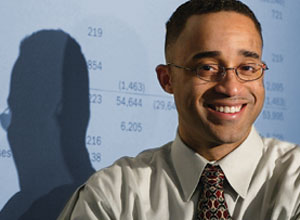 |


|
Winter 2003 | Volume 26, Number 1 | Features | ||||||||
| A Prescription for Graduate School In Difficult Economic Times, a Graduate Degree May Be Just What the Doctor Ordered
Just a few years ago, career-seekers were facing the strongest labor market since World War II. Now, U.S. News and World Report says the number of available jobs has declined by as much as 13 percent over the past academic year — a factor that has forced a decision for many: Continue to court unreceptive employers or pause in the safe harbor of graduate school? “ A downturn in the economy or a period of reorganization in the work sector offers a window of opportunity to pursue graduate education, which in turn strengthens job security and increases advancement potential,” says Lucille Kelley, dean of Seattle Pacific University’s School of Health Sciences. Research shows that people are taking advantage of that window, and graduate school enrollment is on the rise nationwide. This fall, Seattle Pacific posted a 10 percent increase in its graduate programs. The greatest increases were in the disciplines of psychology, business and nursing. The national employment outlook isn’t the only reason for the leap in graduate program enrollment at SPU. President Philip Eaton’s call for a greater institutional emphasis on graduate programs, the achievement of prestigious national accreditations, and the launching of new graduate marketing efforts have all been important contributions to the growth. “ The increased emphasis on Seattle Pacific’s graduate programs is the result of a focus on our vision and our core competencies,” says Vice President for Academic Affairs Les Steele. “This leads SPU to offer advanced programs that prepare students to serve the community in ways that competing graduate programs do not.” For graduate student Heather Stroh, this translates into academic quality, positive relationships, and practical opportunities for applying both classroom knowledge and Christian faith. “I would not be where I am today — from an education or career standpoint — without my experiences at SPU and the caring relationships formed here,” she says. Individual students’ motivations to attend graduate school at SPU vary, emphasizes the dean of the School of Business and Economics, Jeff Van Duzer. “A graduate degree is a personal investment and can be pursued for many valuable and worthwhile reasons.” Stroh says she felt unsure of her career path and lacked direction in a slow job market. Graduate education at Seattle Pacific provided the compass she was looking for. Now in her final year of SPU’s doctoral program in education, Stroh reflects on her journey. “I began my studies with the intention of working as a school counselor and found that I really enjoy research and would like to continue in this field,” she says. A student researcher at Seattle Pacific’s Washington School Research Center, Stroh offers this advice to prospective students: “The idea of going back to school can seem daunting even in the best of times,” she says. “I see graduate school as a beneficial option for those burned out in their careers or searching for ‘something else.’ The benefits and opportunities far outweigh the potential costs or risks.” Managing risk is something 2002 Seattle Pacific M.B.A. graduate Amani Harris knows about. When Harris began graduate study at SPU two years ago, his future already looked bright. The former Army platoon leader had a B.A. in accounting and years of management experience. Despite the booming economy of the late ’90s, he chose to enhance his skill set with an M.B.A. — a decision that he says served him well. After completing the program at SPU last June, Harris is now employed by Edward Jones, a brokerage firm named “2002 Best Company to Work for” by Fortune Magazine. “We’re in a very tough market right now,” says Harris. “My graduate degree gave me the extra advantage and solid foundation I needed to land a job in a very competitive field.” Many prospective graduate students find they don’t have to choose between an advanced degree and a paycheck. Online and evening programs allow them to retain both. Kathy Daley is one such student. Holding down a fulltime job as an apparel developer at a major outdoor retailer, Daley knows a great deal about balance. The second-year marriage and family therapy student takes advantage of a program friendly to working adults. She says, “My decision to attend graduate school would be the same no matter the status of our economic times. And for me, keeping ties to already established job skills and contacts is a good way to ease into a new career.” Her words of wisdom to others considering graduate study? “Sometimes working in a difficult or frustrating job can be more bearable when the job is balanced with goals for the future and fulfilling and interesting study,” says Daley. Whether it’s spurred by economic conditions, a call to serve the community, the need to update career skills, a desire for change — or any other reason — a graduate education is an investment that promises results. It might even keep the doctor away.
BY SARAH JIO PHOTO BY JIMI LOTT |
|||||||||
